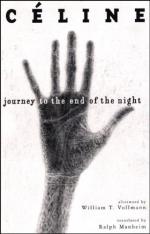|
This section contains 1,941 words (approx. 7 pages at 300 words per page) |

|
SOURCE: "Marxist Criticism of Céline's Voyage au bout de la nuit," in Modern Fiction Studies, Vol. XVII, No. 1, Spring, 1971, pp. 268-72.
In the following essay, Fortier examines Marxist themes, interpretation, and critical reaction to Journey to the End of the Night.
Voyage au bout de la nuit, from its publication in 1932, created around itself an atmosphere of mystery and controversy. The author, who called himself Céline, was unknown. The grammar used in this text resembles that of factory workers, taxi drivers, and hoodlums—an idiom hardly considered to be a fit vehicle for art. The vocabulary is a curious mixture of neologisms, medical terms, and slang, frequently too coarse for mixed company. Yet the language of this novel bears the stamp of high artistic achievement; it moves swiftly and evokes powerful images with an economy of means rarely found in literature, let alone in the lower-class...
|
This section contains 1,941 words (approx. 7 pages at 300 words per page) |

|


